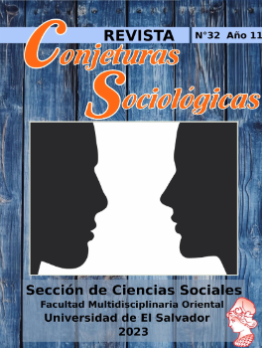Analysis of the specialized training of mathematics teachers and its influence on the academic performance of high school students
A case study in El Salvador
Keywords:
Basic general training, Specialized training in mathematics, Mathematics education, Teaching methodology and strategies, Academic performanceAbstract
Historically in El Salvador there have been difficulties with the results of learning mathematics and no record was kept in the country, it was in 1997 that the Ministry of Education, MINED, resumes raising the Learning and Aptitude Test for Graduates of Secondary Education, PAES. Since 2008 student performance is valued to extend the bachelor's degree, then the Ministry of Education, Science and Technology evaluates AVANZO. It explains the low performance in mathematics from teacher training since this gives theoretical and didactic mastery in the exercise of teaching, which is why this work addresses this variable conjugated with didactic strategies and understanding of the contents. In addition, theoretical contributions, practical results, and the dynamics of the notes from 2007 to 2022 at the country level are offered; leaving a clear picture of the situation studied
Downloads
References
García Cruz, Luis Gerardo (2019). Estilos de aprendizaje como base para la Enseñanza en el Cunorte. http://www.filha.com.mx/upload/publicaciones/archivos/20200206145164_gerardo_handle.pdf
MINEDUCYT (2018). Informe de Resultados PAES. Ministerio de Educación, Ciencia y Tecnología, San Salvador, El Salvador. https://www.mined.gob.sv/paes/2018/Informe%20de%20resultados%20PA ES%202018.pdf
MINEDUCYT (2019). Informe de Resultados PAES. Ministerio de Educación, Ciencia y Tecnología, San Salvador, El Salvador. https://www.mined.gob.sv/2021/01/informes-y-justificacion-paes-2019/
MINEDUCYT (2018). Censo Escolar 2018- Sistema Regular. https://www.transparencia.gob.sv/institutions/mined/documents/resolucion es-de-solicitudes?page=17
MINEDUCYT (2020). Plan Nacional de Educación 2021. San Salvador, El Salvador. https://www.mined.gob.sv/
MINEDUCYT (2017) Ley de Carrera Docente. Reforma. file:///D:/User/Mariel%20Ayala/Descargas/Ley_de_la_Carrera_Docente_(c on_reforma_de_2017).pdf
MINED (2019). Docentes de la franja costera reciben formación en Matemática. Información de página Web institucional. https://www.mined.gob.sv/2019/11/13/docentes-de-la-franja-costera-reciben-formacion-en-matematica/
MINEDUCYT. Plan de Estudio de Profesorado en Matemática para Tercer Ciclo de Educación Básica y Educación Media. Pdf https://www.mined.gob.sv/wp-content/uploads/download-manager-files/1627465259wpdm_matematica_con_acuerdo_incluido_firmado.pdf
MINEDUCYT (2021). Resultados Prueba AVANZO 2021.pdf
MINEDUCYT. Programa ESMATE. 2023 https://www.mined.gob.sv/esmate/
Monroy, Denisse (2020) Didáctica de la Matemática y su importancia en los profesores en formación. https://revistages.com/index.php/revista/article/view/4
Navarra, Joan Mallart (2001). Didáctica: concepto, Objetivos y Finalidades. Madrid. UNED. file:///C:/Users/Marielos/Downloads/Mallart2001DdidcticaConceptoobjetoyfinalidades%20(1).pdf
Rico, Luis (2000). Investigación en Educación Matemática. Salamanca, España. https://edisciplinas.usp.br/pluginfile.php/51552/mod_resource/content/2/Texto%204%20-%20RICO%20e%20SIERRA.pdf
Unesco (2016). Objetivos de Desarrollo del Milenio https://www.un.org/sustainabledevelopment/es/objetivos-de-desarrollo- sostenible/Unesco. Siteal (2019). Perfil de País El Salvador. https://siteal.iiep.unesco.org/sites/default/files/sit_informe_pdfs/el_salvador_25_09_19_0.pdf
Vallejo Ruiz, M.(2007). La investigación española en educación matemática desde el enfoque conceptual inserto en sus tesis doctorales. Enseñanza de las ciencias: revista de investigación y experiencias didácticas. https://raco.cat/index.php/Ensenanza/article/view/87877
Downloads
Published
Issue
Section
License

This work is licensed under a Creative Commons Attribution-NonCommercial 4.0 International License.
Los autores continúan como propietarios de sus trabajos, cediendo de manera no exclusiva los derechos de difusión a la Revista Conjeturas Sociológicas bajo los estándares de la Licencia Creative Commons Atribución No Comercial 4.0 Internacional (CC BY NC 4.0).





